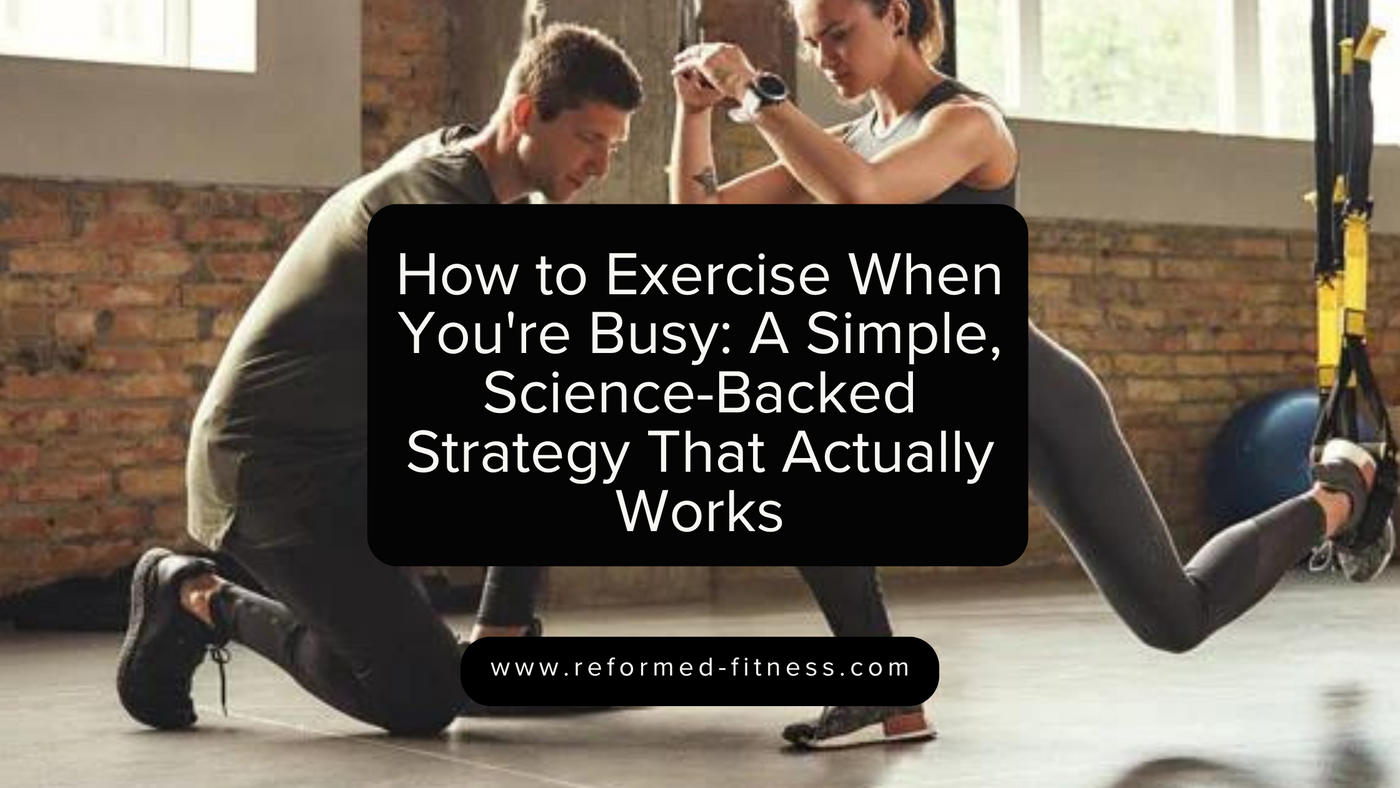Let’s rewind to a Monday morning that might feel familiar.
You wake up energized. Motivated. Because last week, you finally made a plan—the perfect workout routine that’s going to get you back on track.
-
Lift weights four days a week
-
Cardio on Wednesdays and Saturdays
-
A yoga class on Sundays
-
10,000 steps per day
-
And yes, start tracking your food again
It looks amazing on paper. But by Wednesday, work runs late and you miss your cardio. That throws off Thursday’s lift, which cascades into a stressful Friday, and now you're “off track.” By week three, that perfect plan is a memory, and you're telling yourself:
“I’m just too busy to be as healthy as I want to be.”
Sound familiar?
This is the exact spiral we help clients break out of every day at Reformed Fitness. Not because they lack discipline—but because they were sold a version of fitness that isn’t built for real life.
The solution isn’t to work harder.
It’s to simplify. Here's how:
Workout Frequency: Ditch the 5-Day Plan. Commit to Two.
What most people do:
They start with big ambitions. 4–6 workouts per week, each assigned a rigid day. The assumption? More is better.
What to do instead:
Commit to two full-body strength workouts per week. That’s it. But here’s the key: don’t lock those workouts to specific days.
Each week, look ahead at your calendar and pick two 30-minute windows that realistically fit your schedule. Maybe it's Monday and Wednesday one week, Thursday and Saturday the next. Flexibility breeds consistency—and consistency builds results.
This isn’t just a workaround. It’s evidence-based.
Research published in Obesity found that twice-weekly resistance training led to significant improvements in fat loss and strength—even in busy middle-aged adults (Willis et al., 2012). You don’t need more sessions. You need better ones.
Workout Efficiency: Shorter Sessions. Higher Quality.
What most people do:
They assume a workout needs to be 60 minutes to be effective. So when time runs tight, they skip the session altogether.
What to do instead:
Train smarter, not longer. At Reformed Fitness, our clients train for just 30 minutes, twice a week. We use full-body, single-set-to-failure protocols—an approach supported by over 20 years of research in Journal of Strength and Conditioning Research and Sports Medicine.
A study by Westcott (2012) found that a single set performed to momentary muscular failure is as effective as multiple-set routines for increasing muscle strength in time-constrained individuals.
And shorter sessions aren’t just more efficient. They’re more sustainable. A 60-minute workout requires commute time, wardrobe changes, and often forces you to rearrange your day. A 30-minute session from home? You’re in, out, and done before the next calendar alert pops up.
Pro Tip:
Work out at home. Bands, bodyweight, dumbbells, machines—they all work. What matters is effort and intensity, not equipment.
Cardio and Movement: Rethink Your Steps and Sweat
What most people do:
They assume cardio means long, steady sessions—running, biking, or 60 minutes on a treadmill. Or they try to squeeze in 10,000 steps after a sedentary day.
What to do instead:
Use short, high-effort bursts to get the same benefit in less time. High-Intensity Interval Training (HIIT) has been shown to improve cardiovascular health and fat loss in less time than traditional steady-state cardio (Gibala et al., 2012).
Better yet—layer daily movement into your existing schedule.
-
Walk during Zoom calls.
-
Park further away.
-
Take stairs instead of elevators.
A 2012 study in Diabetes Care showed that breaking up sedentary time with light activity—just 1–2 minutes every 30 minutes—can significantly improve fat metabolism and insulin sensitivity (Dunstan et al., 2012).
You don’t need 10,000 steps all at once. You need to keep moving—consistently.
Final Thought: Don’t Build a Perfect Plan. Build a Resilient One.
At Reformed Fitness, we’ve coached hundreds of busy professionals to stop chasing perfect and start pursuing what’s possible—consistently.
Because the reality is:
-
You don’t need 5 workouts per week
-
You don’t need 10,000 steps per day
-
You don’t need 60-minute routines
You need a plan that’s efficient, flexible, and rooted in science.
Simplification isn’t about doing less. It’s about doing what works—especially when life is full.
If you’ve ever felt like you’re “too busy” to be consistent, chances are the plan was the problem, not you.
And we can help.
Schedule your FREE 1-on-1 Discovery Call today to see how just two 30-minute workouts per week can transform your consistency, confidence, and results—without disrupting your life.

